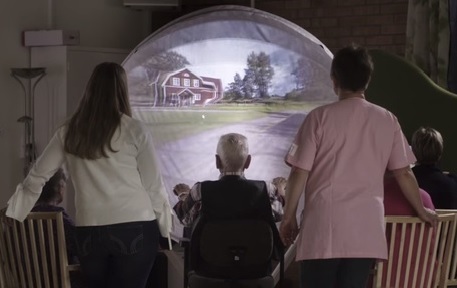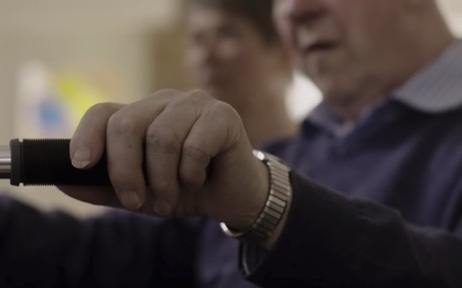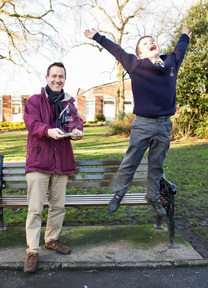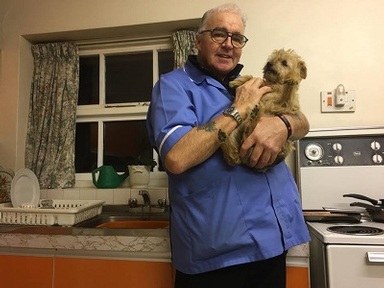Google Maps takes people with dementia on trip down memory lane
Our strongest memories are intensely tied to location. It’s no coincidence that when you think about any big memory or past event, your first thought is often “Where was I when that happened?”
 With the help of researchers, people with dementia can now take a virtual trip down memory lane - using a Google Street View simulator to 'bike around' old neighbourhoods and streets they have a strong connection to.
With the help of researchers, people with dementia can now take a virtual trip down memory lane - using a Google Street View simulator to 'bike around' old neighbourhoods and streets they have a strong connection to.
Anne-Christine Hertz, from the Centre of Health Technology in Halmstad, Sweden, is the biomechanical engineer behind the jDome BikeAround simulator. She said: “We wanted BikeAround to be as realistic as possible. When you sit down, you should feel that you are there.”
She added: “BikeAround allows people with dementia to pedal around the neighbourhoods of their childhood and talk about their memories and what happened in those places with the people around them.
“Google Street View, which is streamed on a dome-shaped projector screen, is connected to the stationary bike, which moves with every pedal and turn of the handlebars.”
The jDome BikeAround, created by Swedish company Brighter, is designed to immerse people living with dementia within a virtual replica of real-world streets – locations that have some personal significance.
Truls Sjösted, chief executive of Brighter, says the hope is to kickstart a memory of a particular time or place: a walk to work, a walk home, a fight, a glance, a kiss.
“With this device, we can take the people, put them in charge, go back to where he or she wants, and make him or her the guide,” he says.
Recapturing memories
The jDome BikeAround combines mental stimulation from surrounding the individual with places they recognise, and physical stimulation from pedalling and steering. This combination triggers the release of dopamine in the brain, which researchers think could have a profound effect on helping people to regain, or at least retain, memories.
According to researchers, jDome BikeAround has become an 'optimal piece of equipment' for people living with dementia, and is now used in 50 healthcare centres across Sweden alone.
A relative of one BikeAround user said: “This new technology really blew me away. Imagine allowing your loved one the ability to bike around the neighbourhood where they were lived, or use it to go home,” while another commented: “It gives the person living with dementia a real experience; and, I believe this would help people with the condition to become calmer.”
Memory loss is a distressing part of dementia, both for the person with the condition and for those around them. As with any other aspect of dementia, memory loss affects each person differently and is often one of the first signs of the condition.
Father of three Bengt Ivarsson has mild dementia and struggles to remember dates, names and significant events. Using BikeAround, the 82-year-old was able to go on a ride around the streets of his childhood home in Töreboda, Sweden.
On the ride he passed the place where he first saw his wife Laila and recalled the moment in 1959 “as if it were yesterday” where he turned to a friend and said, “I am going to marry that one”.
Similarly, 75-year-old Lars Jonsson and his wife Ingrid married 35 years ago. Lars has also developed dementia.
Ms Hertz recalls: “As Lars sat in the saddle, Ingrid suggested we take him back to the city and church in which they got married. Lars’s face flickered with happiness as the church rose up before him. The expression on his wife’s face when she knew for sure that he remembered was heartwarming.”
The road ahead

Martina Kane, senior policy officer at Alzheimer's Society, suggests a product like BikeAround can be used for exercise, rehabilitation, triggering reminiscence and providing sensory stimulation.
She said: "Virtual reality is emerging as a therapy to help people recovering from a stroke and also to help with symptoms of dementia and some mental health conditions.
"Some early studies suggest that people with dementia are able to use and enjoy virtual reality environments, but research needs to be extended to include more people with different types of dementia and at different stages of the condition.
"By increasing funding for dementia care research, we can continue to explore how the latest technologies can be adapted and used to help provide better care for the 850,000 people currently living with dementia in the UK.”
Research is still being carried out on the effect that BikeAround can have on preserving memory.
Latest Innovative Care News
 13-May-19
'Pink drink' brain cancer treatment rolled out across NHS in memory of Baroness Jowell
13-May-19
'Pink drink' brain cancer treatment rolled out across NHS in memory of Baroness Jowell
 25-Apr-19
Louis Tomlinson helps 83-year-old who lost wife to dementia complete bucket list
25-Apr-19
Louis Tomlinson helps 83-year-old who lost wife to dementia complete bucket list
 05-Mar-19
Care worker of the year inspires nine-year-old son to work in care
05-Mar-19
Care worker of the year inspires nine-year-old son to work in care
 12-Feb-19
Michael McIntyre's jokes tested to see if they stop elderly catching flu
12-Feb-19
Michael McIntyre's jokes tested to see if they stop elderly catching flu
 25-Jan-19
Ninety-year-old and his dog can stay together, thanks to care worker
25-Jan-19
Ninety-year-old and his dog can stay together, thanks to care worker